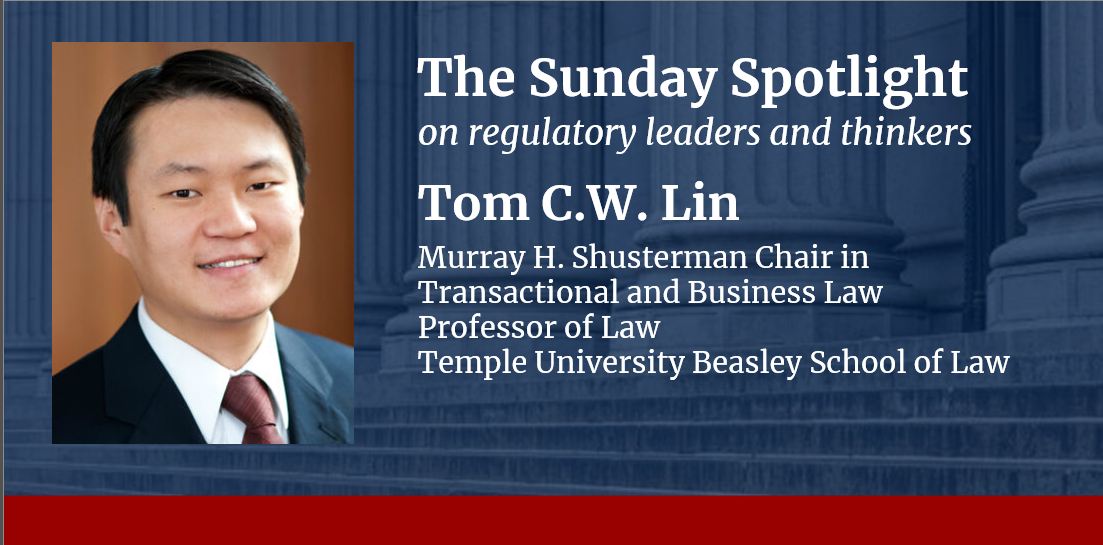
Tom C.W. Lin discusses the risks and opportunities presented by corporations’ increased involvement in political issues.
In a conversation with The Regulatory Review, Tom C.W. Lin, an expert on corporate governance and securities law, discusses the risks and opportunities presented by businesses’ increasing involvement in political matters.
In recent years, many large companies have become more outspoken on political issues such as reproductive freedom and climate change. Companies’ stances on these issues sometimes lead to conflicts with elected officials. For example, when Disney CEO Bob Chapek criticized a Florida bill to limit discussion of gender and sexuality in schools, Florida Governor Ron DeSantis responded by increasing his office’s oversight of the governing district for Walt Disney World. Recently, some companies have ended or altered their diversity, equity, and inclusion initiatives in response to President Donald J. Trump’s executive order “encouraging the private sector to end illegal DEI discrimination.”
Lin argues that businesses’ increased involvement in political issues has led to a “convergence” of politics and business. This convergence, he notes, can encourage industry and government to work together to solve large-scale problems, such as climate change and cybersecurity, that neither is well-positioned to solve unilaterally. But, Lin warns, it can also rankle investors, weaken public trust in democratic institutions, and make businesses more vulnerable to “business warfare” from other countries through mediums such as sanctions and cyber-attacks.
Lin recognizes that corporations are “inherently political” organizations. Still, he recommends that corporate leaders adopt an approach he calls the AILS Framework—analyze, internalize, localize, and specialize—when weighing whether and how to engage with sociopolitical issues.
Lin is the Murray H. Shusterman Chair in Transactional and Business Law and a professor of law at Temple University Beasley School of Law, where he has twice received the George P. Williams Memorial Award for Outstanding Professor of the Year. He is also an Academic Fellow at George Washington University’s Center for Law, Economics & Finance. He was previously on the faculty of the University of Florida Levin College of Law.
The Regulatory Review is pleased to share the following interview with Tom C.W. Lin.
The Regulatory Review: In your recent research, you have observed a “convergence of the corporate and political spheres” in today’s world. What do you mean by this?
The convergence of the corporate and political spheres reflects how businesses and governments now overlap in addressing societal challenges. Over the last decade or so, businesses have become more engaged in some of the most pressing and challenging issues facing society and politics. Through their capital and policies, companies have directly acted on issues such as climate change, racial justice, reproductive freedom, voting rights, gun violence, affirmative action, gender equity, and international conflicts. And in turn, this corporate social engagement has drawn both praise and reward as well as criticism and retribution from government actors. As such, increasingly, corporate governance has become political governance, and political governance has become corporate governance. Collectively, this dynamic has led to the convergence of the corporate and political spheres.
TRR: What opportunities does this convergence present?
When working well and appropriately, this convergence could lead to smarter collaborations between corporations and government, which can unlock innovative solutions to significant challenges that neither government nor business could tackle as effectively or efficiently on their own. The political governance processes of government alone often might be too recalcitrant and unimaginative to address these pressing challenges. At the same time, businesses might lack the large-scale resources and near-term market incentives to focus on these issues in a timely manner. Truth be told, many of the critical challenges of our time on issues such as cybersecurity, climate change, and public health are simply too large, too important, and too complicated to leave to governments or businesses to face on their own. Thus, corporate and political convergence can create fruitful opportunities to bring the best of the private and public sectors together to work smartly for progress on the large, pressing problems confronting our communities.
TRR: What risks does this convergence create for businesses?
Although there are opportunities, this convergence also poses real risks for businesses. First and foremost, it exposes businesses to substantial political and public backlash from consumers, shareholders, interest groups, and political actors opposed to specific social and political stances. Engagements by businesses on certain social and political issues can polarize stakeholders, create internal divisions, and distract businesses from their core operational goals. Furthermore, politically motivated reprisals, such as sanctions, regulatory scrutiny, and punitive legislation—as seen in recent incidents involving major companies such as Disney—underscore these risks.
TRR: What larger implications does this convergence have on society and government?
The rise of corporate engagement in social and political issues could erode faith in democratic institutions, values, and norms. As businesses increasingly engage in these issues, more people will look to corporations and an elite managerial class to solve society’s problems. This shift could weaken our democratic institutions and processes, along with the public’s faith in them. Many people could increasingly expect the government to operate like a business or to privatize its functions. This expectation can be highly problematic because conventional business objectives of profit and efficiency may contravene core democratic values such as justice, equal protection, and promoting the general welfare. For instance, caring for the sick and poor may be unprofitable, but these are nevertheless worthy pursuits for a compassionate, democratic society. Similarly, disaster relief, public safety, disease control, and access to education should never be driven entirely by conventional business metrics of efficiency, revenue, or profits.
TRR: Your research on corporate political governance argues that we need a new “overstory” for corporations. What is this new overstory?
Stories about corporations are often reduced to simplistic caricatures: businesses amorally chasing private, shareholder-maximizing profits in contrast to public-interest pursuits as noble, selfless quests for the collective good. This depiction erroneously implies that private enterprise and public service operate in completely separate worlds. Instead, we need a new corporate overstory—one that recognizes corporations as inherently political and unabashedly profit-driven, yet fundamentally human-centered institutions. This fresh perspective will hopefully help us break away from old, tired traps and broaden policy debates beyond single-minded profit pursuits of businesses on one timeline, or none at all. Rather than being stuck in a zero-sum world where the pie never grows as businesses selfishly pursue profits, this new overstory creates practical and theoretical space for exploring possibilities and realities where shareholders profit while stakeholders simultaneously benefit across multiple timelines.
TRR: How can businesses better decide when to get involved in certain political and social issues?
In a recent article, I proposed the AILS Framework to guide corporations on navigating social and political issues more effectively. It comprises four strategic steps: analyze, internalize, localize, and specialize. First, companies should analyze issues carefully, ensuring alignment with core values, resource allocation, stakeholder expectations, and strategic interests. Second, companies should internalize their stance authentically within their culture and governance, maintaining consistency between public statements and internal practices. Third, they should localize their approach, prioritizing issues directly relevant to their specific communities and operational contexts. Finally, companies should specialize and strategically engage where they can leverage competencies to make meaningful contributions. By adopting this framework, businesses can more thoughtfully engage with complex sociopolitical issues, balancing profit-driven objectives and stakeholder responsibilities effectively while minimizing risks.
TRR: Another line of your research addresses business warfare—attacks on businesses by nation-states using tools such as sanctions and cyberweapons. How can governments and the businesses they regulate protect themselves from these attacks?
I have suggested that governments and businesses can better protect themselves from business warfare through three pragmatic near-term strategies. First, they should engage in robust business war games to proactively anticipate and respond to various scenarios of economic hostilities and cyberattacks to better prepare themselves. Second, both public and private sector actors should adopt smart cybersecurity guidance complemented by targeted incentives to encourage private firms to invest adequately and timely in their cybersecurity infrastructure. Finally, greater diversification of supply chains and market operations can reduce vulnerabilities and mitigate disruptions from targeted attacks. Although perfect protection against the threats of business warfare is not possible, these measures collectively help to create stronger resilience against increasingly sophisticated economic and cyber threats posed by state and non-state actors.
TRR: Is there a relationship between business warfare and increased corporate involvement in domestic and international politics, or are they separate phenomena?
There is indeed an interrelated relationship between business warfare and increased corporate involvement in politics. As businesses engage more deeply in political issues domestically and internationally, they become more prominent targets for adversarial actions by governments and other actors. Politically connected firms often become proxies in battles between nation-states, as seen in sanctions targeting state-owned enterprises or cyberattacks aimed at high-value companies. At the same time, businesses’ growing political clout attracts scrutiny and hostility from adversaries seeking to exploit this prominence. Furthermore, the heightened exposure and vulnerability resulting from business warfare can compel firms to take more active political and diplomatic stances to protect their interests. Thus, the rise of corporate political involvement and business warfare is, in many respects, a mutually reinforcing phenomenon that represents an evolving interplay between business and geopolitics in an uncertain, complicated world.



